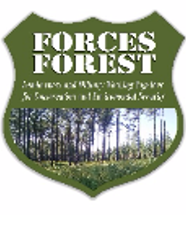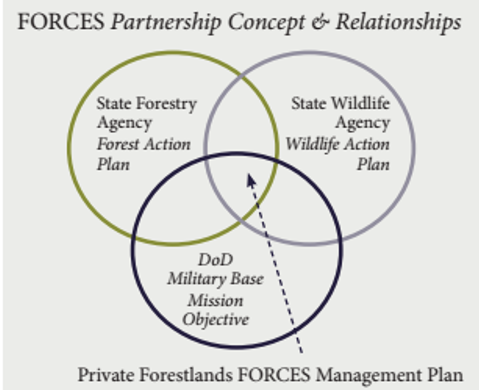What is Forest Opportunities for Resource Conservation and Environmental Security (FORCES)?
FORCES is a joint partnership that includes the NC Forest Service (NCFS), the NC Wildlife Resource Commission (NCWRC), Camp Lejeune, and Fort Bragg. The goal for this partnership is to recognize and assist landowners who are voluntarily managing their woodlands in and around area of military interest that are crucial to their training mission.
What does FORCES do?
- It provides planning assistance through NCFS and NCWRC foresters, rangers, and biologists.
- It recognizes landowners for their conservation efforts and support of our military.
- It conducts focused outreach and education through workshops and promotional campaigns.
Who can participate in FORCES?
- Landowners with 10 or more acres of forestland located within a FORCES Project Area and who are managing their property according to a comprehensive woodland management plan.
How are FORCES Project Areas determined?
- Areas have been defined through partner collaboration, with the military installation leadership having the final decision authority.
What are the current benefits to FORCES participants?
- Funds are currently available for NCFS to develop qualifying Stewardship or FM plans, as well as regeneration and practice plans that are in support of an existing comprehensive plan.
- Recognition through signage and certificates of appreciation will be provided to participants.
- Participants will be invited to workshops and outreach events.
Is FORCES voluntary?
- Yes FORCES is 100% Voluntary. Landowners may decline participation or opt out of the program at any time.
Will FORCES participation result in military accessing private property?
- No, FORCES is a forest conservation program and does not authorize military access to participant properties.
Why is our military interested in conservation on private lands?
- Development pressures near our military installations have increased, resulting in negative impacts on the ability to train. Incompatible land uses on private lands have resulted in restrictions to flight routes and to on-the-ground training. Preventing this loss helps ensure the future of our military’s training mission.
- Loss of forestland near the installations has created more dependency on our military to protect critical wildlife habitat. Private working forest near these areas can be an effective complement to these protection efforts.
- Our military wants to inform landowners about their training mission and how the various uses of private land can aid or hinder the training mission and readiness of our troops.
For more information, contact the FORCES Coordinator Phil Wallace by email or phone at Phillip.Wallace@ncagr.gov or (919) 553-6178 Ext. 228

